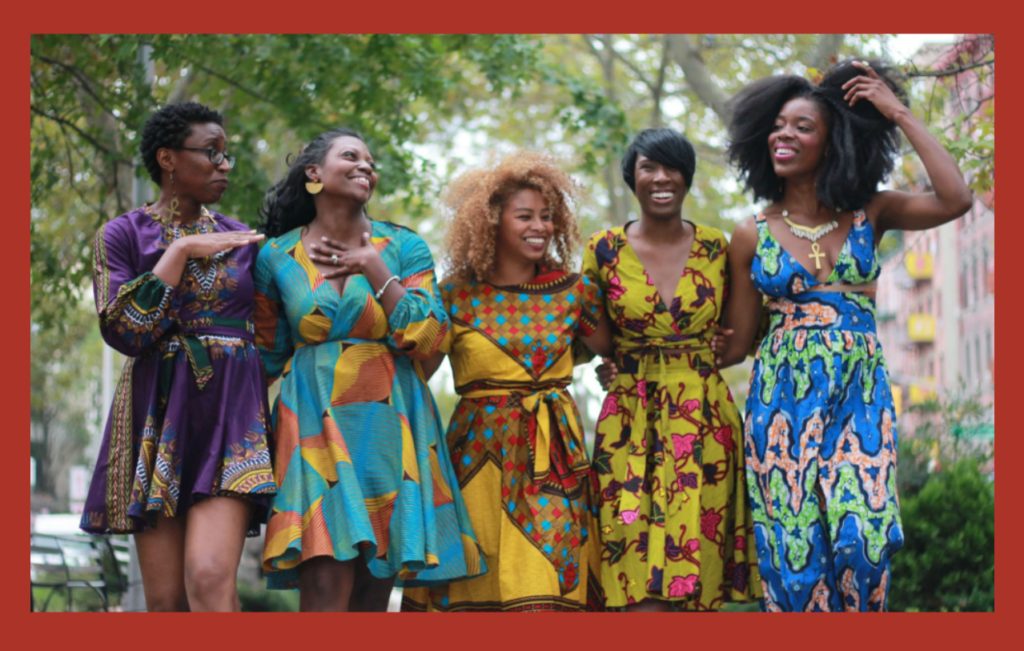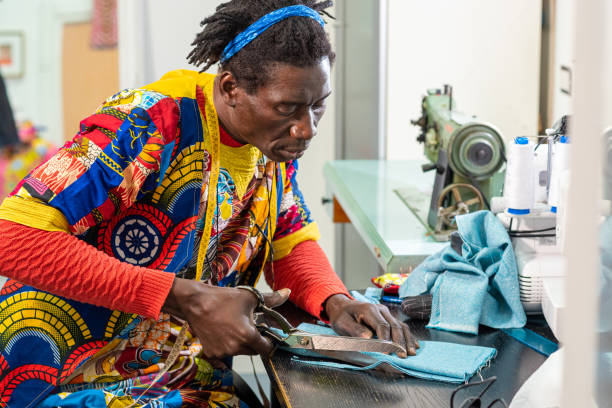“I’ve always loved and wanted to wear African prints more here,” says Bami Adenike, expressing her enduring fondness for African wear despite staying close to alluring luxury boutiques in Paris. Adenike, a 28-year-old Nigerian artist, moved to France in 2016 and has mostly bought clothes from French fashion retail stores since relocating due to the prohibitive costs of having custom-made African dresses shipped to Europe.
By late 2020, when Adenike wanted to update her closet, she discovered a number of online platforms offering to deliver African apparel to Europe, at affordable rates, and took a chance ordering through Fashtracker, a marketplace that connects more than 40 African designers with local and international consumers. Within two weeks, her prints were delivered to her door in Paris by DHL.
“I have to admit I was shocked the dresses were well fitted. I used to spend hours looking through Ankara images on Pinterest without any idea how to get them,” she told TechCabal on a phone call. “Now, it’s become a norm for me to patronise brands from Nigeria and sometimes other West African countries.”
African fashion has in recent times attracted significant media interest from the Global North, partly fueled by megastars—such as Naomi Campbell, Alicia Keys, and Beyoncé—who occasionally rock clothes designed on the continent. Last year, the latter, a 28-time Grammy award winner, was spotted wearing a patterned dress and wide-leg pants made by Tongoro, a Senegalese brand owned by designer Sarah Diouf.
While entertainment celebrities have had a hand in propelling African designers to international fame, Africans in the diaspora like Adenike are the biggest consumers of clothes exported from the continent, with e-commerce platforms—such as Nigeria-based Fashtracker and Ivorian site Afrikrea—playing middlemen.
The African Union Commission defines the African Diaspora as “peoples of African origin living outside the continent, irrespective of their citizenship and nationality and who are willing to contribute to the development of the continent and the building of the African Union”. Globally, this group is spread out across several continents. An estimated 36 million Africans live outside the country of their birth, with just over 50% resident within the continent. The sheer size of the African Diaspora means there’s a large potential market for African fashion collections outside the continent.
In an interview with TechCabal for this article, Fashtracker founder and CEO Wunmi Akinsola revealed the platform was originally built to serve markets in Africa. But that changed when the team realised more traction was coming from outside the continent than within. “I was only running ads for Nigeria and neighbouring countries, and yet about half of my customers came from other parts of the world. So, it became obvious that there’s a massive market out there,” Akinsola said.
Moulaye Tabouré, the founder of Afrikrea, grew up in Mali but has lived and worked in several countries. While in Paris, he discovered that the Africans he came across abroad were mostly interested in African fashion items but could not readily access them. That inspired the founding of his online marketplace in 2016 with the ambition to export African culture globally.
“A few months after we launched and had some designers, our close ones noticed we were wearing more African products and got more interested,” Tabouré recalled in an interview with TechCabal. “Afrikrea led us to consume more from African businesses, not by solidarity or charity, but out of pure interest.”
This year, Afrikrea’s community of merchants has carried out almost €8 million worth of transactions, according to the company’s data, with over 80% of its orders coming from outside the continent—40% from Europe and 30% from the US. It claims to record more than 500,000 site visits monthly.
Despite facing stiff competition from several other similar platforms, Tabouré believes product diversity has helped Afrikrea grow rapidly, considering the African Diaspora isn’t a monolithic group. “The black diaspora is the largest in the world and also probably the most heterogeneous. So having a wide array of sellers, products, and experiences to cater to everyone has always been key to our success,” he said.
Afrikrea and its counterparts are increasingly attracting African designers and micro-businesses along the fashion and art value chains that wish to gain awareness among customers outside the continent. Within five years, Afrikrea grew its seller base from 500 to 10,000 across 47 African countries and currently allows them to showcase and sell African-inspired clothing and accessories to 170 countries around the world.
Essentially, these platforms provide a gateway to reach global consumers demanding African fashion collections and handle all the resource-intensive components, including marketing, cross-border shipping, and payments, which would otherwise hinder local fashion designers and dealers from selling outside their national borders.
“After launching on Instagram and boosting our post, we started getting a lot of inquiries from people abroad about purchasing items. But there was no way to get things to them effectively,” says John Pelumi Oyedokun, founder and creative director of Mode Vert Limited, a Nigerian company behind fashion label Jon Pelumi, which launched in 2019. Oyedokun then partnered with Fashtracker after Akinsola reached out to him. “After signing up [on Fashtracker], we’re able to sell our products to a growing customer base in Ghana, the US, and Canada.”
For Olakunmi Oni, Lagos-based fashion designer and the founder of minimalist women’s clothing line, 1964 Brand, selling online and shipping abroad was never a problem but admits that listing her brand products on Fashtracker “shows our designs to a much wider audience.”
Typically, designers selling on e-commerce sites can create storefronts and receive payments from anywhere in the world. Once a purchase is made, the platform deducts a commission of 10-15% per sale. For the logistics side of things, Afrikrea, for instance, has a partnership with DHL that allows micro-retailers selling via its platform to ship to their customers for as low as $20 per package. The company also recently launched ANKA, a SaaS e-commerce solution for African fashion designers and merchants, offering a single dashboard to manage multiple sales channels, inventory, and payments.

Whether curators like Afrikrea or single-brand sites such as Ghana’s KIKI Clothing, platforms for African fashion tap into a growing global demand for African designer goods, riding on e-commerce. Africa’s e-commerce opportunity is estimated to be $19.8 billion by Statista, and in terms of general e-commerce activities on the continent, McKinsey & Company estimates consumer spending to reach $2.1 trillion by 2025.
That presents an opportunity for local retailers to promote African fashion globally, especially with consumers increasingly switching to online shopping amid the raging Covid-19 pandemic. For designers, partnerships with e-commerce platforms transform their otherwise small tailor businesses into fashion brands with global patronage while opening up the $31 billion sub-Saharan Africa clothing market to the rest of the world.
But scaling globally isn’t without its own challenges. Custom officers mostly within the continent still pose a major constraint to cross-border shipment, especially in the absence of an effective free trade agreement. “Initiatives like the AfCFTA are there but yet to become concrete realities,” Tabouré said. He adds that African governments can do more by facilitating customs for people shipping outside of the continent, particularly to Europe. “We want to take African culture to you wherever you are. Our job is mainly to remain optimistic but pragmatic.”
If you enjoyed reading this article, please share it in your WhatsApp groups and Telegram channels.




















